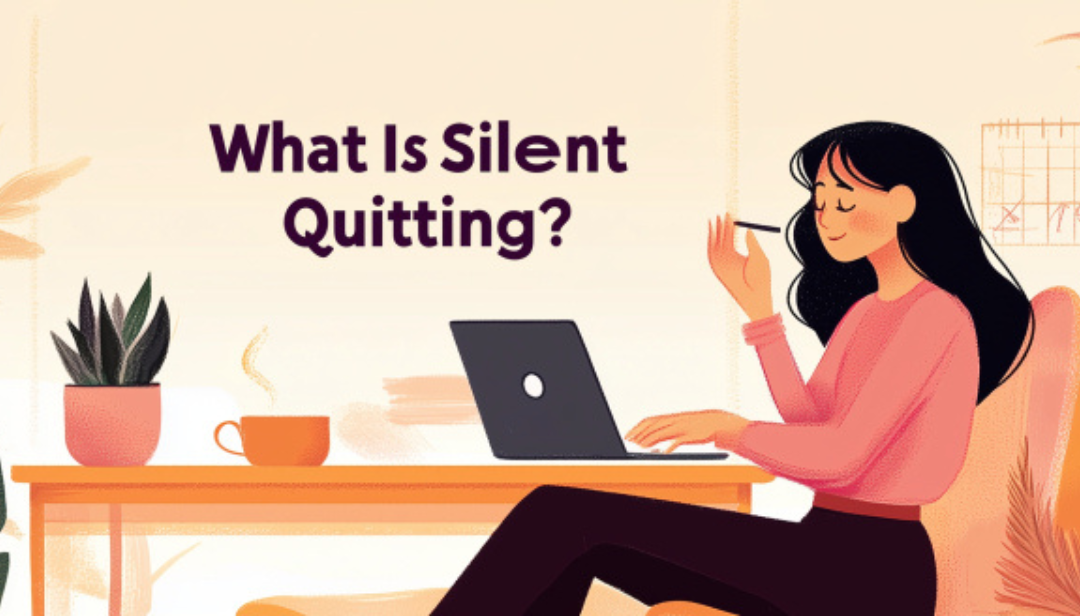Have You Quietly Quit Your Job? Understanding Silent Quitting: Signs, Causes, and Implications of Quiet Quitters
Quiet quitting is when employees disengage from their work and organization without overtly expressing dissatisfaction or intentions to leave. This subtle withdrawal often highlights deeper issues within workplace culture or employee well-being. Understanding silent quitting can help identify signs, causes, and implications, ultimately leading to more supportive and productive work environments.


Back
7 mins read
There are days when life can feel overwhelming. You wake up, already dreading the long to-do list ahead of you and anxiously counting the hours until bedtime. Your stressful day may be filled with work deadlines, family obligations, financial concerns, or relationship issues.
By the end of the day, you are mentally exhausted and physically drained.
In moments like these, many people may find themselves wanting to escape from their problems by numbing out through various means, such as excessive screen time, binge eating, or even drinking alcohol.
While these behaviors may provide temporary relief, they can also be a sign of a larger issue—silent quitting.
Keep reading because you may have experienced this phenomenon without realizing it. In this article, we will define quiet quitting, explore its potential causes and effects, and offer tips on addressing it.
Quiet Quitting Defined: What Is Silent Quitting?

Quiet quitting, also known as silent quitting, is a term used to describe the act of avoiding or escaping from difficult emotions and situations through seemingly harmless behaviors.
Despite the dramatic-sounding name, in workplace settings, quiet quitting doesn't mean stealthily slipping your resignation letter across your boss's desk.
Rather, it's about doing just what's expected in your job role and nothing beyond.
It's when you clock in, fulfill your duties, and clock out—eschewing overtime, extra tasks, or the so-called “going above and beyond.” It's essentially a way of setting boundaries and prioritizing personal time over work, often due to feelings of burnout, lack of recognition, or simply not finding the work fulfilling.
Is Quiet Quitting Real?

Whether the quiet quitting trend is truly new or simply a catchy name for a long-existing internet phenomenon depends on how you define it. On the surface, there's strong evidence to suggest both sides. The term itself exploded on social media, particularly TikTok, in 2022. This viral spread brought the concept of employee disengagement to the forefront of the conversation, making it feel like a new issue.
A 2022 Gallup survey shows at least 50% of the US workforce exhibits signs of quiet quitting, meaning they meet expectations but don't go above and beyond. Additionally, data on employee engagement shows a slight decline in recent years, which could be partially attributed to this trend.
However, if we look beyond the terminology, quiet quitting might simply be a new way of describing employee dissatisfaction that has existed for a long time.
Workers who are unhappy at work but not necessarily looking to leave entirely have likely always found ways to cope. The "quiet" aspect might be new, with employees choosing a more subtle approach to setting boundaries and prioritizing personal time over work.
So, the answer is complex. While the specific term and the social media hype surrounding it might be new, the underlying phenomenon of employee disengagement likely isn't. It's more a case of a pre-existing issue getting a new label and a fresh wave of attention in the current work climate.
Signs You May Be a Quiet Quitter
Silent quitting can be challenging to spot, as there are no obvious signs like handing in a resignation letter or behaving in a manner that gets you fired.
However, some red flags indicate you might be mentally checking out (and potentially headed for work burnout):
- Decreased communication and engagement in team meetings unless addressed directly;
- A sudden drop in productivity, lack of motivation, or lower quality of work;
- Turning down work outside your job description;
- Increased absenteeism or tardiness without explanation; or
- Disengagement from co-workers and company events.
Why Do People Quit Silently? (Instead of Actually Quitting)

Quiet quitting is often a coping mechanism to avoid uncomfortable feelings or situations. Here's more explanation as to why folks might find themselves doing it:
Burnout
Ever feel like you're running on fumes? That's burnout. The demands and stressors of daily life can accumulate, leading to mental, emotional, and physical exhaustion. To cope, people might silently quit by just doing what they have to do to avoid getting even more fried.
Lack of Recognition or Appreciation
Imagine working hard but feeling like nobody notices. If your efforts go unnoticed, it's natural to lose the motivation to go the extra mile. Quiet quitting can be a way of saying, "Hey, I see myself here, and it would be nice if you did too."
Being Treated Unfairly
When employees face favoritism, exclusion, or discrimination at work, it chips away at motivation. Instead of speaking up, some quietly disengage — doing only what’s required while pulling back emotionally. Silent quitting can be a way of coping when unfair treatment makes the workplace feel unsafe or unbalanced.
Need to Switch Career Paths
A most recent 2024 HubSpot Consumer Trends Report cites that 24% of quiet quitters eventually switch careers altogether. This statistic highlights a crucial point: sometimes, quiet quitting can be a sign that a deeper issue exists—a job that just isn't the right fit.
Fear or Avoidance of Confrontation
Confronting difficult emotions or situations can be scary and uncomfortable. For some, it's easier to silently quit than to address these issues head-on. This fear or avoidance can stem from various reasons, such as a lack of assertiveness, past traumas, or simply not knowing how to communicate effectively.
Feeling Stuck in a Rut
Another main reason people quit silently is feeling stuck in a rut. Especially for younger folks—the Millennials and Gen Zs just starting a job can feel like a hamster wheel—same stuff, different day. If the work doesn't challenge you or align with your interests, it's easy to fall into quiet quitting mode.
Experiencing Quiet Firing
While the term "fired" often implies a big, in-your-face dismissal, sometimes it happens slowly and subtly (quiet firing). If you feel like your employer isn't giving you enough work or responsibilities to keep you occupied and fulfilled, they might be quietly firing you. In response, you might silently quit (without actually leaving) as a way of protecting yourself from the perceived rejection.
Impacts of Quiet Quitting: The Good and the Bad

When deciding whether quiet quitting is good or bad, the answer isn't as black and white as we'd like.
For instance, quitting quietly may be beneficial for an employee, especially if it means protecting their mental health or reclaiming their personal life. On the flip side, employers may find this trend counterproductive and costly.
Keep reading as we weigh the positive and negative implications of quitting silently from both sides.
Positive Impact of Quiet Quitters
As mentioned, there are valid reasons to engage in quiet quitting—some of which, like avoiding burnout or getting ready to switch careers, can have positive outcomes. Here's a closer look at how quiet quitting can benefit individuals and even organizations:
Protecting Mental Health
Burnout and chronic stress can take a significant toll on a person's mental health and physical well-being. By silently quitting, individuals can protect themselves from further harm. This self-preservation tactic is essential in maintaining good mental health and preventing burnout.
Prioritizing Personal Life
Work-life balance has become increasingly important in today's fast-paced world. Silent quitting can be a way for employees to set boundaries and prioritize their personal lives, leading to increased happiness and satisfaction outside of work.
Encouraging Company Reflection
If many employees are silently quitting, it may be a sign that the company needs to reflect on its culture and practices. This can lead to positive changes in policies and procedures that benefit all employees. Some of these changes may include promoting a healthier work-life balance, recognizing and appreciating employees' efforts, ensuring fair compensation, and creating a more fulfilling work environment.
Negative Impact of Quiet Quitters
Silent quitting has its share of negative consequences for individuals and organizations. Here are some of the potential downsides of mentally checking out:
Low Employee Engagement
Disengaged employees are exactly that — disconnected and uninterested in their work. This disengagement can manifest in a lack of enthusiasm, creativity, and initiative. Imagine a team meeting where everyone goes through the motions, but nobody contributes new ideas or feels invested in the project's success. That's the potential downside of a workforce riddled with silent quitters.
Decreased Productivity
When you're simply going through the motions, productivity takes a nosedive. Deadlines might be missed, the quality of work might suffer, and projects could be delayed. This not only impacts the individual's performance but also leads to negative consequences for the organization. Remember, instead of quietly quitting, you can always quit a job in a professional manner.
Stalled Skills and Career Growth
Imagine putting your car in park — it might feel comfortable for a while, but you're not going anywhere. Similarly, you're not actively seeking new challenges or learning new skills by just doing the bare minimum. This stagnation can hurt your career growth in the long run, making it harder to get promoted or find a new job down the line.
Toxic Work Culture
A team filled with many quiet quitters can breed a negative and unproductive work environment. The lack of enthusiasm and initiative can be contagious, dragging down morale and making it even harder for everyone to feel motivated and engaged.
How to Combat Quiet Quitting Trend: 4 Tips for Employers

When employees feel like the employer isn't giving them enough work or fulfilling responsibilities, it can be hard to find the motivation to stay engaged. Here are some tips for dismissing the quiet quitting mindset in an employee:
- Create a positive and inclusive work culture. Happy and engaged employees are less likely to check out mentally. Try to foster a positive and supportive work environment where even actively disengaged and psychologically detached employees feel valued and appreciated.
- Encourage open communication. Quiet quitting employees may not feel comfortable speaking up about their concerns. Create channels for employees to share their thoughts, ideas, and concerns without fear of repercussions. This can help identify any issues or red flags before they escalate.
- Recognize the root causes. Is poor management, lack of recognition or development opportunities, or unreasonable workload causing engaged workers to start checking out? Identifying and addressing any underlying factors can help prevent future quiet quitters.
- Be upfront about expectations. Research shows that 40% of job switchers among the Great Resignation are already searching for another job. Why? Because many companies are too vague about their expectations. Clearly define roles, responsibilities, and expectations from the get-go to avoid misunderstandings or frustrations.
Quiet Quitting Employees Are Far from Silent

Quiet quitting isn't quiet — or silent — but it is loudly recognizable. It speaks of the power in taking control over our own lives. Not only does choosing to quit speak volumes about us, but it is also an active decision we make for ourselves.
When we quietly quit, we are acknowledging that something is not serving us and that we have the power to change it, even if we aren't ready to leave entirely. It's a way of setting boundaries, saying no to unhealthy habits or toxic environments, and yes to our physical, mental, spiritual, and emotional well-being.
However, while quiet quitting can be a necessary first step in reclaiming our work-life balance and protecting our mental health, it is not a long-term solution.
Eventually, the underlying issues that prompted the quiet quitting must be addressed. Whether it's through seeking changes within the organization or making the bold decision to leave fully, actively quitting and finding a new job may be the ultimate step to true empowerment and fulfillment.
In a time when self-care and work-life balance are prioritized, quiet quitting is a signal that something needs to change. It's a coping mechanism, but one that should lead to more significant actions.
Recognizing this distinction is crucial in our journey towards a healthier, more satisfying professional life.


Return to Blog






